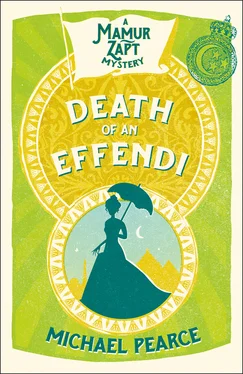‘No.’
‘Why no talking?’
‘They’re talking about money.’
The waiter smiled.
‘You not got?’
‘That’s right,’ said Owen. ‘Not got.’
The waiter squatted down on his haunches, ready to drift into conversation in the easy way of the Egyptians. The pressure was off the waiters now and he could afford to relax.
‘Me, too,’ he said. ‘Not got.’
‘Got wife yet?’
The waiter looked glum.
‘Money first,’ he said. ‘Then wife.’
‘Same here.’
That was not quite true. There were other reasons preventing, or perhaps delaying, his and Zeinab’s marriage: the attitude the British Administration would probably take to one of its servants marrying an Egyptian, for a start. But then, Zeinab herself was uncertain. Did she want to marry an Englishman?
‘Welshman,’ pleaded Owen.
As Zeinab was not quite sure about the difference between the two, that made her even more uncertain. She knew that Wales was, or had been, like Egypt, an independent country and that, like Egypt, it had been conquered by the English. But where did that leave Owen? Was he, like so many young Egyptians, a secret Nationalist? But if so, how did he come to be Mamur Zapt? And what would happen when they found out? If Zeinab was doubtful about marrying one of the conquering English, she – ever the realist – was even more doubtful about marrying one of the losing Welsh, particularly, if as seemed to be the case, there was more than an outside chance that the English might garotte him.
The real obstacle, however, Owen suspected, was that having invested so much willpower in creating a life for herself as an independent woman, which took some doing in Egypt, she hadn’t got quite enough left to take the last step, making an independent marriage.
But would her father, Nuri, in fact object? He and Owen had always got along well. But getting on well was one thing, marrying a daughter quite another. Pashas like Nuri tended to view marriage as a means of political and financial alliance. It might suit him for the moment to have his daughter close to the Head of the Khedive’s Secret Police but that advantage would be only as temporary as a civil servant’s career. As for financial advantage, Nuri knew only too exactly how little Owen earned. So, yes, it was true what he had said to the waiter: they were in the same boat.
The waiter jerked his thumb in the direction of the financiers.
‘They lot of money,’ he said. ‘Why they want more?’
‘That’s the way of rich men,’ said Owen.
‘True,’ acknowledged the waiter, still brooding, however. ‘But why they here?’
‘Egypt not got,’ said Owen.
That was even more true. In fact, it was so true that Egypt’s international creditors had felt obliged to set up a commission, the Caisse, to make sure that they were repaid. The British had been installed, or installed themselves, as managers on behalf of the commission, and now it was a good question who really ran the country; the Khedive, Egypt’s nominal ruler, the British Consul-General, whose hand was on all the strings, or the Caisse.
The waiter was silent.
‘Egypt rich country,’ he said after a while, the sweep of his hand taking in the fields with their cotton and sugar cane and fruit. ‘Why not got?’
‘Ah, well,’ said Owen. ‘You’ll have to ask the Khedive.’
The waiter went into the hotel and returned with a newspaper, which he gave to Owen. It was a copy of Al-Liwa , the leading Arabic Nationalist paper. Ordinarily, he would have read it the previous night – one of the Mamur Zapt’s duties was to read all the newspapers – before publication – but because he had been away he had not been able to.
He looked at the newspaper and felt vexed. They had slipped up in his absence. There on the front page was a reference to the financiers’ visit. What were they here for, demanded Al-Liwa ? Was it to suck yet more blood out of Egypt’s already dried-up veins? Well, if blood was what they wanted, blood was what they would—
Owen gave the newspaper back to the waiter. He was used to the sanguinary rhetoric of the Nationalist newspapers and it did not bother him. However, they had been trying to keep the visit secret. The negotiations were important and neither the British Administration nor the Khedive wanted them disturbed by any unfortunate incident.
‘Not got,’ said the waiter, jerking his thumb again, ‘because all money go out of country to people like them!’
If even ordinary waiters were saying such things, thought Owen, was it any wonder that other people were?
Tvardovsky kept, or was kept, apart from the other Russians. At lunch he came and sat with Owen.
‘How’s it going?’
‘They have no vision,’ said Tvardovsky. ‘They see only roubles.’
‘What do you see?’
‘I see fields of grain,’ said Tvardovsky. ‘This was once Rome’s granary. It could be again.’
‘Depending on what?’
‘Water,’ said Tvardovsky, ‘and pumps.’
‘And money?’
‘Well, naturally.’
‘People, too,’ said Owen.
‘Yes,’ granted Tvardovsky, ‘people are important.’ He looked at Owen. ‘You know the country,’ he said. ‘How would the people feel?’
‘I think they would need to feel part of it,’ said Owen.
‘And at the moment they don’t,’ said Tvardovsky. ‘That is because they are serfs.’
‘Well, not really—’
‘The next best thing to. We were serfs, too, in Russia,’ said Tvardovsky. ‘I was one. Or, rather, the son of one. So I know.’
‘I don’t think it’s quite the same in Egypt.’
‘They need to feel part of it. Will the British make them feel part of it?’
‘We have done a bit,’ said Owen.
‘No,’ said Tvardovsky. ‘The answer is no. But Russians could.’
Owen looked at the financiers on the adjoining tables.
‘You said they had no vision.’
‘Not these.’ Tvardovsky dismissed them with a contemptuous wave of his hand. ‘Others. Have you heard of a Russian named Kropotkin?’
‘No,’ said Owen.
‘He is a prince. But an unusually intelligent one. He says that cooperation, not competition, is the natural way of things. You British will not make the ordinary Egyptian feel part of things because you believe in competition. But that is not what the ordinary man wants. It is not natural to him. What is natural is cooperation. And that is what is needed here.’
‘And Mr Kropotkin will bring it?’
‘Alas,’ said Tvardovsky. ‘It may take a bit of time.’
After lunch the financiers, unused to the heat, returned to their tents for a siesta. Owen took a chair, however, and sat outside beneath an orange tree, where the foliage was thick enough to give dense shade. He could have gone back to his tent, next to Tvardovsky’s, but from here he could see better.
At about four the financiers began to emerge from their tents and make their way to the armchair area, where they were served afternoon tea. They drank their tea, as the Egyptians did, without milk.
From time to time someone came and led one of them off. Individual interviews had been arranged with the Governor of the Bank of Egypt and the Financial Adviser. ‘In the end,’ said Tvardovsky, ‘a financier has to work alone. We do not trust each other.’
Tvardovsky went for an interview, too. Owen accompanied him to the tent but did not go in.
Dinner was early in view of the shoot the next day. Tvardovsky sat at Owen’s table again. He drank heavily.
‘Steady on,’ said Owen. ‘We’re making an early start tomorrow, remember.’
‘Ah yes,’ said Tvardovsky. ‘The killing.’
It was still dark but in the tents the lamps were on. Suffragis hurried about carrying bowls of hot water for shaving and coffee for those who needed it. Up on the terrace a light breakfast had been prepared but the main breakfast would be later, after the shoot. People were already walking down to the water.
Читать дальше












